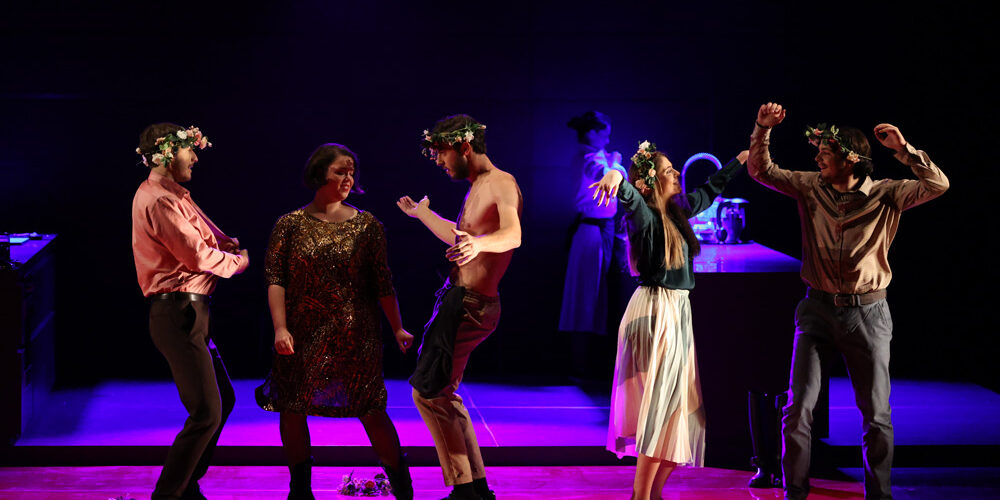Photo: Zoran Škrbić
Madlenianum Theatre, Belgrade, premiere 29th October 2021
August Strindberg’s Miss Julie has become a blueprint for the representation of the relationship between different social classes.
The play explores the class and gender dynamics between Julie, a young aristocrat trapped by her privilege and rigid upper-class norms, and Jean, an ambitious servant who partly gains power over Julie by sleeping with her.
It is a dynamic that has been replayed and relocated many times, from Sweden in the 1880s when the play was written. Yael Farber directed Miss Julie in 2012 setting it in post-apartheid South Africa where Julie and Jean can’t form a meaningful relationship because of their country’s racist hierarchy. More recently, playwright Amy Ng has adapted Strindberg’s play to the setting of colonial Hong Kong in 1948, and Michael Omoke re-imagined the play in colonial Kenya at the beginning of the 20th century. Kaite O’Reilly’s Missing Julie set the play in the UK in the aftermath of the First World War.
The post-Yugoslav region isn’t an exception. It has also recently acquired a production of Miss Julie that examines class dynamics of the region. Bosnian director Haris Pašović directs Strindberg’s play at Madlenianum Theatre in Belgrade, after a 30-year hiatus for his work in the city, setting it in contemporary Slovenia.
In collaboration with the dramaturg Jelena Paligorić Sinkević, he presents Julie as a daughter of a Slovenian mogul who is no more an aristocrat in this adaptation, but her ancestors were. At the same time, Jean is her servant who comes from Serbia, a Gastarbeiter or guest worker who earns a living at her father’s estate. Kristine, Jean’s partner and a cook at the estate, comes from Bosnia, while six more episodic characters represent the rest of the workers who come from different parts of the so-called Western Balkans. Just like in the play, the story happens during the nightly celebration where alcohol, sleeplessness and a party atmosphere lead to acts of passion between the main two characters, and ultimately to their regrets.
It’s an interesting choice adapting the story through the lens of national relations, as well as those of class. Miss Julie could easily be set at a mogul’s estate where the servants are of the same nationality as the owners, but this concept gives Pašović a possibility to spotlight the economic inequality that exists between the EU and non-EU citizens. “Tens of thousands of young Balkans go to the EU for economic reasons and do the hardest physical work there. They are becoming a new social class, the lowest in the European social hierarchy.” – Pašović notes in his interview for SEE Stage. And this concept fits well into the original story – the servant Jean is ambitious and solidly self-educated, but he’s unable to move up the social ladder, so he tries to do that by sleeping with drunken Julie.
Sara Dirnbek, a Slovenian actress in the role of Miss Julie, and Strahinja Blažić, a Serbian actor in the role of Jean, play their characters as complete opposites. Julie is a spoiled and brash young woman who acts as she owns everyone below her social level. She openly tries to seduce Jean in front of his partner Kristine (Mina Pavlica) and Dirnbek performs her as a loud and impulsive person who speaks Slovenian at the beginning, wanting to express authority over Jean, but later switches to Serbian during more intimate moments. Blažić as Jean, on the other hand, is calm and calculated, observing Julie from a distance, and when he sees the moment is right, accepts Julie’s seduction and engages in rough and unemotional sex with her that seems more choreographed than life-like (choreography by Igor Pastor). There’s also a later S&M scene where Julie ties up Jean with slow, expressive movements and teases and spanks him with a kitchen knife. These cold and stylized sex scenes represent the characters’ impossibility to form a meaningful emotional bond because of their prejudices and social stigmas, but perhaps a bit predictably since Bergman and Antonioni used sex as an expression of alienation in their films way back in the 1960s.
But even though Strindberg’s story of class vanity (Julie and her family) and class shame (Jean) work well adapted to the 21st century and even though economic differences are growing astronomical, being comparable to Strindberg’s time, the end of the show where Julie contemplates and possibly commits suicide seems ill-fitted for contemporary society. Someone like Julie who’s so assertive and (self) destructive probably wouldn’t have a problem with sleeping with whomever she wants from the working class, and neither would her rich father, as long as she doesn’t marry the “lucky man”. Of course, Julie’s father might be ultra-conservative or her sex with the servant might be the last drop that makes the cup run over in her life full of pressures, but these options are left to the spectator’s imagination and the narrative of a rich spoiled kid making a fuss about a one night stand, let alone of contemplating suicide, feels anachronistic and an ode to Strindberg’s time.
Besides this omission, the show generally stays consistent with its concept and other elements of the production should also take credit for that. The scenography by Aleksandar Denić presents a minimalistic but luxurious kitchen, but it also has symbolic qualities as it is surrounded with darkness while the middle and the front of the scene are illuminated with gentle blue and red light (lighting design by Srđan Jovanović). The music by Marko Grubić, with hard electro-beat sounds that are at times interrupted by folk elements, is a good background for the ensemble of workers to party and dance ecstatically to, also representing the mix of traditionality and contemporaneity in their lives.
Miss Julie boldly and creatively tackles important social topics of today, but it feels as it would have benefited from a freer adaptation, not persistently clinging to some details of Strindberg’s play.
Author: August Strindberg
Director: Haris Pasovic
Set designer: Aleksandar Denic,
Costumes: Irma Saje and Vanja Ciraj Dzudza
Composer: Marko Grubic
Choreographer Igor Pastor
Playwright: Jelena Paligoric Sinkevic
Borisav Matić is a critic and dramaturg from Serbia. He is the Regional Managing Editor at The Theatre Times. He regularly writes about theatre for a range of publications and media.
He’s a member of the feminist collective Rebel Readers with whom he co-edits Bookvica, their platform for literary criticism, and produces literary shows and podcasts. He occasionally works as a dramaturg or a scriptwriter for theatre, TV, radio and other media. He's the administrator of IDEA - the International Drama/Theatre and Education Association.








